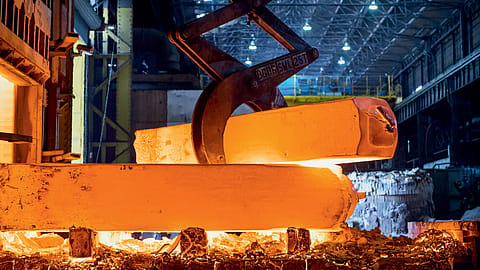New Green Hues Of Tata Steel U.K.
Ailing Port Talbot unit’s transition to green steel set-up with 40% revival cost borne by Britain.

This story belongs to the Fortune India Magazine October 2023 issue.
TATA STEEL'S U.K. BUSINESS, majorly the Port Talbot site, got a fresh lease of life after the British government approved a £500 million grant to the ailing steelmaker to build a 3MTPA green steel project. The scrap-to-steel project, which will use electric arc furnace (EAF), will come up at Port Talbot, replacing the existing two coal-based blast furnaces. According to Tata Steel executives, the £1.25-billion project will be completed within 36 months following regulatory approvals.
About 40% of the project cost will be through grants from the U.K. government. Tata Steel is now consulting the Unions on job cuts. About 3,000 of which are expected to be lost across Tata’s 8,000-strong U.K. workforce as the steelmaker shifts to less labour-intensive EAF. The switch to EAF will help save £150-175 a tonne out of the cost of $660 per tonne.
Carbon emission from the Port Talbot site will reduce by 5MT per annum after the switchover, says Koushik Chatterjee, executive director and CFO, Tata Steel, in an analyst call. The project will also use locally available scrap. Britain produces 10MT of scrap every year, which is largely exported and imported back as steel.
Since the acquisition of Corus Plc (formerly Tata Steel Europe) for $12 billion in 2007, Tata Steel has been struggling to turn around the business due to rampant import of cheap steel from China. The British government was not keen to support coal-based steelmaking due to sustainability targets. Non-availability of gas and surging energy prices were hindrances as well.
Meanwhile, Tata Steel’s proposed merger with German company Thyssenkrupp also failed to take off due to high German pension liabilities. Tata Steel U.K. was running in losses, and the pandemic and the Russia-Ukraine war forced the management to plan shutting down the business. It was then that the British government offered to rescue the company.
“Tata Steel has been facing structural issues in the U.K. due to several assets reaching end of life, especially in Port Talbot. This resulted in higher outages, escalated operating costs and pressure on the quality of material produced. Financial performance deteriorated significantly over the years,” adds Chatterjee.
In FY23, Tata Steel U.K. reported a negative EBITDA of £127 million. In Q1 FY24, the EBITDA loss was £39 million.
More Stories from this Issue
“Reinvestment in the existing asset (at Port Talbot) should be economically and environmentally viable. The carbon cost is around £70 million a year. Any other counterfactual would have been a long-drawn process and resulted in significant cost with implications across the company,” Chatterjee explains in the call.
The U.K. consumes around 9MTPA of steel, including value-added products. Tata Steel U.K. has a 5MT production capacity. The flat steel produced by the company has over 50% market share in the automotive industry. It also has 43% share in construction and 62% in packaging.
Building a sustainability-focused business in the U.K. was an important driver for Tata Steel. Moreover, the management wanted to ensure that the rescue solution would make the business operationally and financially competitive.
Tata Steel will restructure its consolidated balance sheet to reflect the non-cash impairment of legacy investments, including historical funding and support for the losses incurred in the U.K. business, says Chatterjee. “It will improve Tata Steel’s financial outlook due to elimination of cash losses and fresh equity infusion from the parent,” he adds.
(INR CR)